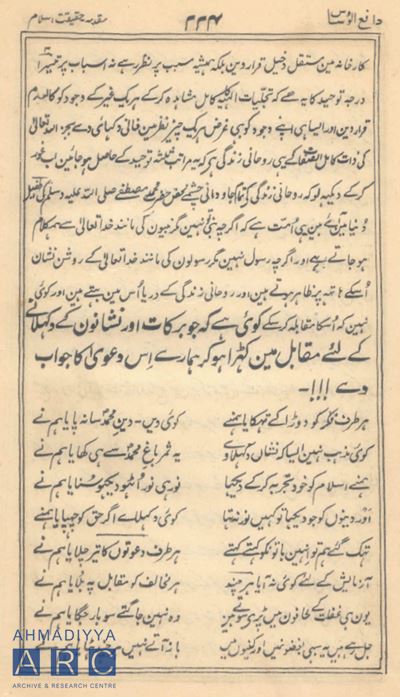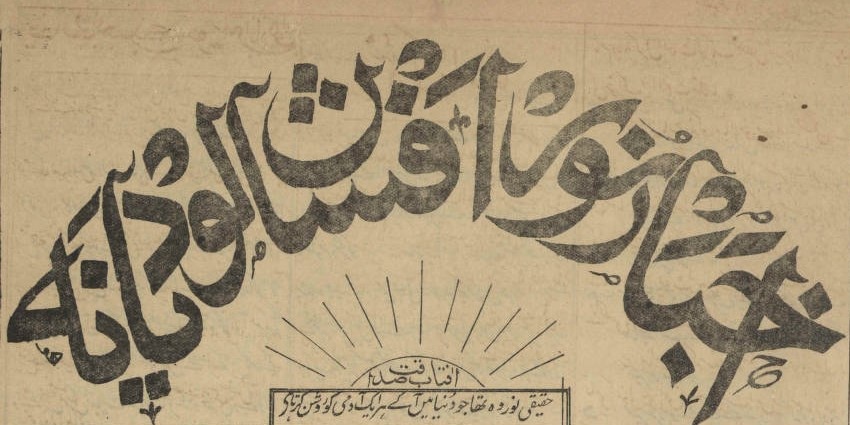Ata-ul-Haye Nasir, Ahmadiyya Archive & Research Centre
During his concluding address at the Jalsa Salana UK 2024, Hazrat Amirul Momineenaa narrated about the Promised Messiah’sas profound love for the Holy Prophet Muhammadsa, stating it was characterised by complete self-effacement (fana) in the Holy Prophet’ssa love. Huzooraa highlighted how the Promised Messiahas set a path for attaining true love and devotion to the Holy Prophetsa, providing guidance that could enlighten even those who opposed his message. Huzooraa expressed that the ongoing opposition to the Ahmadiyya Muslim Jamaat is based on misconceptions that the Promised Messiahas, God-forbid, sought to diminish the status of the Holy Prophetsa. However, Huzooraa pointed out that these allegations stem from the self-serving motives of certain Muslim clerics.
The Promised Messiah’sas overwhelming love for Allah the Almighty and the Holy Prophetsa is evident from each and every word of his books. It is not only his prose that wears this crown, but his transcendental poetry too has the gold dust of this love on its wings.
It is sometimes thought by his opponents that the Promised Messiahas wrote poetry as worldly poets usually do, but to understand the stature of his poetics, one must know where in his works and for what reason it has occurred. In the ebb and flow of his mighty writings, on occasions when he felt that prose was not the best way to convey his message, his pen began to express his inspirations in poetic verse.
It is also asserted that since he has written poetry, he cannot be a prophet because poets are not in any way worthy of prophethood. The paragraphs above should suffice to negate such notions, however, if anyone wants further elaboration, please read our article, titled “The Promised Messiah’s usage of verse”, at alhakam.org (20 March 2020).
‘No Faith did we find like the Faith of Muhammadsa’

When we look at the Promised Messiah’sas poetry, we find that the purpose of his poetry was to proclaim the Oneness of Allah, express love for the Holy Prophetsa, draw on the Holy Quran’s beauty and the announcement of his claims.
In this article, we will endeavour to mention only one of his poetic works and to narrate its background and objective. In one of his poetic works in praise of the Holy Prophet Muhammadsa, the Promised Messiahas stated:
ہر طرف فکر کو دوڑا کے تھکایا ہم نے
کوئى دِیں دِینِ محمد سا نہ پایا ہم نے
“We wearied our mind by searching all around; No Faith did we find like the Faith of Muhammadsa.” (Aina-e-Kamalat-e-Islam, Ruhani Khazain, Vol. 5, p. 224)
In this poem, Huzooras highlighted the fact that the status which has been granted to him by Allah the Almighty, is purely due to the absolute obedience to the Holy Prophet Muhammadsa and that he is having to endure all kinds of abuses, disrespectful titles and opposition merely because he has immersed himself in the love and obedience to the Holy Prophet Muhammadsa.
This poem makes it crystal clear that the Promised Messiahas did not bring any new religious law, in fact, he was proud in the fact that he is subordinate to the Holy Prophet Muhammadsa. He followed the religion of Islam to the letter and was totally averse to changing even the smallest of its commands. If anything, he spent his entire life proving the excellence of Islam and its superiority over all other religions.
The background: Nur-i-Afshan’s claim
As far as the purpose behind this specific poem is concerned, we find that a Christian newspaper, Nur-i-Afshan of Ludhiana, published an article on 13 October 1892, and presented the following Biblical verse:
“Jesus said unto her, I am the resurrection, and the life: he that believeth in me, though he were dead, yet shall he live.” (John 11:25)
The article stated that whoever believes in Jesusas in this manner, will attain salvation and a spiritual life. It further wrote that since the creation of Adam, no human being has made such a big claim and used such words for himself that “I am the resurrection, and the life”.

The Promised Messiah’sas response
In his book, Aina-e-Kamalat-e-Islam, the Promised Messiahas mentioned this article and gave a detailed refutation to this claim of the newspaper.
Hazrat Ahmadas stated that if Jesusas had actually claimed to be the resurrection and the life, he being a truthful prophet of God, his claim would have been proved true and spiritual life would have spread in the world in his own lifetime as well as after he had passed away. However, the amount of success he achieved in spreading the Oneness of God was so small in comparison to the other Prophets.
Huzooras also refuted the notion that Jesusas performed certain miracles which are often attributed to him, for instance giving life to the dead.
Huzooras then presented a comparison between the Companionsra of the Holy Prophet Muhammadsa with the disciples of Jesusas and proved that, in reality, it was the Holy Prophetsa who had the power to bless people with a spiritual life, not Jesusas.
After presenting a number of arguments to refute this claim of Christians, Huzooras shed light on the magnificence and blessings of the Holy Prophet Muhammadsa, and wrote:
“The claim [da‘wa] of our Holy Prophetsa is shining like the Sun, and one of the major proofs of the Holy Prophet’ssa everlasting [spiritual] life is the fact that his everlasting blessings are still continuing. Moreover, the one who shows obedience to the Holy Prophetsa in this era as well, it is, undoubtedly, as if he is brought to life from the grave and is granted a spiritual life. It is not merely an imagination, but rather, its authentic and true signs are manifested. Therefore, such a person is granted heavenly support and blessings and an unprecedented succour of the Ruh-ul-Qudus.
“In addition, such a person becomes distinct amongst the other people of the world, so much so that he has a communion with God Almighty, and He grants him the information about His special secrets and reveals to him His true knowledge and understanding. Through him, He manifests the shining signs of His love and blessings, descends His support for him, grants him His blessings and makes him the reflection of His Rububiyyat [Lordship]. His tongue begins to utter wisdom, fountains of deep insights emerge from his heart, he is granted the knowledge about the secrets, and God Almighty gloriously manifests Himself upon him and grants His nearness. And hence, he stands superior and victorious over all others in terms of acceptance of prayers, acceptance of supplications, insights into the true understanding of God, revealing of the divine secrets, and the abundance of blessings upon him.
“Hence, with regard to these very matters and for the completion of proof after being appointed by God Almighty, this humble one has sent thousands of registered letters to the prominent opponents in Asia, Europe and America, so that if anyone claims that this spiritual life can be attained by any means other than the obedience to the Khatamul Anbiyaa [Seal of the Prophets], may peace and blessings of Allah be upon him, they ought to contest with me, and if this is not possible, then come as a seeker of truth to witness the blessings and signs. However, no one paid heed to it with truthfulness and sincerity, and by way of staying away, they testified to the fact that they all are engrossed in [spiritual] darkness.
“In addition, some of our contemporary co-religionist brethren, despite being called as Muslims, are denying this divine light. They neither accept it nor come with pure intention to test it, and are adamant on declaring me kafir [disbeliever]. […] If someone closes their home’s door that is facing the Sun and sits in a dark corner, it will not be the fault of the Sun if its light does not reach them, but rather, it would be their own fault who acted like this. […]
“These are completely absurd claims of the Christians when they say that Jesusas was the spiritual resurrection and that they came to a new spiritual life by immersing themselves in him. The Christians ought to remember that there is not even a slightest of proof of [their claim about] Jesusas being the manifestation of the resurrection. […] Now, you ought to ponder and witness the fact that it is only the Holy Prophet Muhammadsa, the Chosen One, through whom the world has attained all everlasting fountains of spiritual life.” (Aina-e-Kamalat-e-Islam, Ruhani Khazain, Vol. 5, pp. 221-224)
The Promised Messiahas then challenged:
“Is there anyone who could respond to this claim of mine by competing with me in manifesting the blessings and signs?” (Ibid., p. 224)
This was followed by the poem, mentioned in the beginning of this article, wherein he highlighted the grand status of the Holy Prophet Muhammadsa and the magnificence of Islam. Moreover, speaking about his own spiritual status, he made it clear that the status which has been granted to him by Allah the Almighty, is purely due to his absolute obedience to the Holy Prophet Muhammadsa. (Ibid., pp. 224-226)
Conclusion
In short, this is the perfect example of the true purpose behind the Promised Messiah’sas usage of poetry. It is unfortunate that the opponents of the Promised Messiahas raise objections over his poetry just for the sake of opposing him and fail to realise as to why and where he used this method in his writings.

